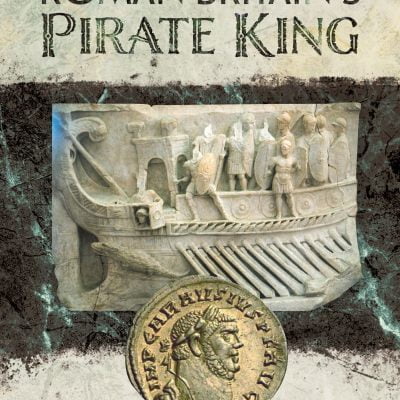Book “Roman Britain’s Pirate King; Carausius, Constantius Chlorus and the Fourth Roman Invasion of Britain” by Simon Elliott is another book by the famous English historian on the history of ancient Rome. This time we get to know an extremely interesting period in the history of the Roman Empire – the revolt of Carausius from the end of the 3rd century CE. This Roman commander separated Britain and part of northern Gaul from the Roman state and concentrated power in his hands for almost 10 years (286-293 CE), destabilizing the Empire in the north.
The book is divided into six chapters. Of course, the author first makes a profuse introduction to the period of the Roman Empire, presents important information, gives ancient sources and contemporary studies, and presents his approach to the issue. In the following chapters we get acquainted with: the political and military evolution of the Roman state; we get the description of Britain during the crisis of the 3rd century CE; we get to know the figure of Carausius and the factors that could induce him to rebel. Carausius was probably a capable leader, but according to sources, he proclaimed himself emperor in Britain after he fled Gaul in 286 CE, before his arrest and execution (he was accused of amassing the spoils taken from the pirates he fought with), by order of Emperor Maximian.
The inability to quickly suppress the rebellion by Augustus in the west – Maximian – meant that Carausius could probably receive the unofficial title of the provincial governor. The temporary lack of threat from the legal rulers allowed Carausius to make reforms in Britain – including defensive (numerous forts were built on the south-eastern coast) and economic (mainly coinage developed). The self-declared man focused on minting coins and propaganda – coins with his image are found to this day.
With the stabilization of the endangered limes in the Empire, another expedition against the rebel was commissioned; this time the Roman army was commanded by the experienced commander Constantius Chlorus (father of the later emperor Constantine), who was appointed emperor in the west and became Maximian’s deputy. Constantius recaptured the lands of what is now northern France under Carausius. This led to the betrayal in Britain and the death of Carausius in 293 CE, who was replaced by Allectus; the new ruler, however, only lasted 3 years. In 296 CE, after an impressive and swift campaign, Constantius regained the province.
The book was published by Pen and Sword Military. Due to the fact that I received an electronic version for the review, it is difficult for me to comment on the print. The book has over 160 pages. Personally, I missed illustrations that would certainly diversify the content; it is possible, however, that in the material version they are at the end of the publication. The good division of the book and, above all, the numerous bibliography should also be emphasized.
The publication is certainly a great proposition for anyone who wants to learn more about the Roman province of Britain, the transformation of the Roman army and the organization of the Empire later in its existence, and finally about the extremely interesting last years of the 3rd century CE. The figure of Carausius is extremely interesting and shows how complicated times the Roman empire was entering in the 4th century CE.


